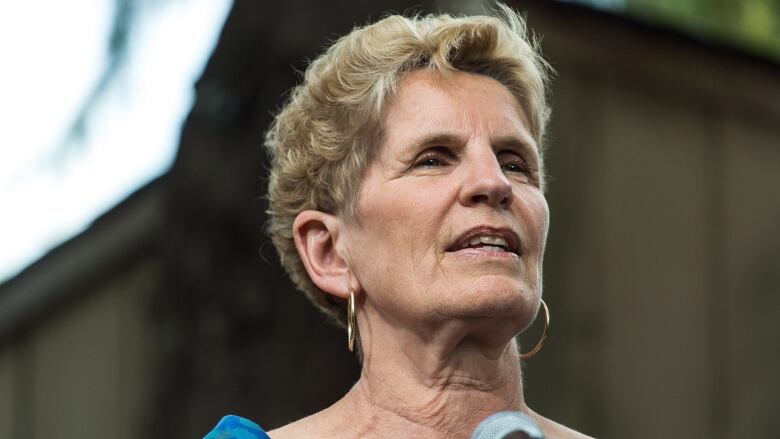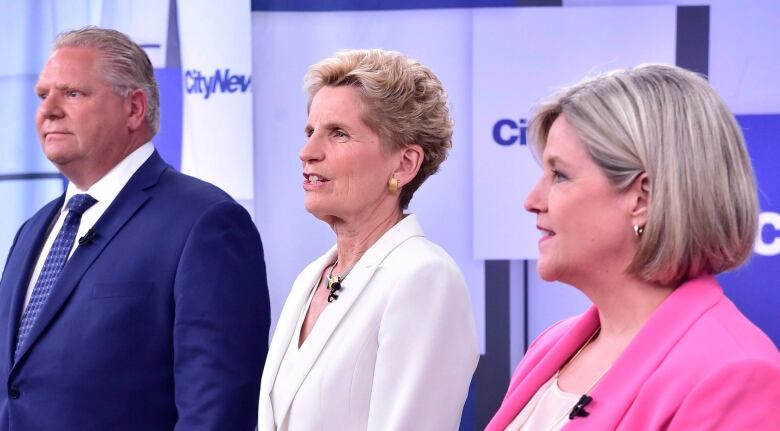The Ontario Liberal implosion has been extraordinary, but it wasn't inevitable: Robyn Urback
Wynne's meandering campaign could have benefited from finding the middle ground

The consensus is not simply that the Ontario Liberals will lose this week's election, but that the party will be utterly and thoroughly annihilated. Indeed, if the party fails toeke out at least eight seats a disaster that seems quite possible just a few days out it will lose official party status in the legislature.
This implosion was not inevitable, however. Far from it. While the prospect of the Liberals running away with this election was always unlikely what with the profound disapproval of Premier Kathleen Wynne'sleadership, andPCs enjoying double-digit leads for some time the Ontario Liberals typicallyrun verystrong campaigns. They've made up for deficits in the past.
Perhaps it would've been unrealistic to think they were going to win this thing, but it was by no means a given that they would end up in such tatters. But the Liberals simply couldn't find a distinct and persuasivemessage, and they suffered because of it.

The best opportunity for the Liberals to define themselves came when Doug Ford was elected PC leader. The perception of Ford, then and still largely now, is that he is of the extreme right: an advocate of major tax cuts for big business, austerity measures for Ontarians, union-busting and so forth.On the campaign trail, however, he's beenmore of a right-wing-seeming populist who has made $8 billion worth of uncosted promises, but perception here, as everywhere, matters more than reality.
With NDPLeader Andrea Horwath occupying the left and trailing in third at the time, there was an opportunity for Wynne to claim or reclaim a space in the centre. Instead, her team continued on its pre-election path of promising Ontario voters just about everything: dental and drug coverage, universal daycare, expanding the Greenbelt, increased hospital funding, more money for mental health care and so forth, all of which, they said unabashedly, would plunge Ontario back into deficit.
Out NDP-ing the NDP
It was a peculiar about-face considering Finance Minister Charles Sousa had, a year earlier, boasted about the province's first balanced budget since the recession and projected budget balance until 2019-20. (Though that "balance" was largely achieved thanks to creative Liberal accounting, but never mind.)
In any case, the result was the Liberals looked an awful lot like the NDP, even out NDP-ing the NDP on certain issues (their universal daycare pledge, for example, as opposed to the NDP's means-tested proposal). So the choice left to anti-Ford voters was one between Andrea Horwathand a less-liked, already tried, scandal-ridden version of Andrea Horwath.
- Wynne pinpoints the moment she realized she couldn't win
- Wynne says election is lost, urges voters to ensure NDP or PC minority
Granted, there's no guarantee that voters would've bought Wynne's newfound dedication to moderation, had she taken the centrist path. And the platform would've had to endure irritating pundits like me poking holes in fair-weather promises of balanced budgets, tempered spending measures, a more gradually increased minimum wage and so on.
But at the very least, her team would have presented voters with an option distinct from Ford on the rightand Horwath on the left. Something clear, moderate and defined.
That didn't happen. If anything, the initially leftward path set out by Wynne's campaign team became even more confusing in recent days, with the Liberals slamming the NDP's conciliatory attitude toward unions, despite their own long history of conciliatory gestures, and pledging to use budget surpluses (what are those?) to pay down the debt.
That was capped off with a bizarre new slogan "sorry, not sorry" which came off as an arrogant taunt to Ontario voters who don't appreciate the Liberals'value. (The intention, of course, was to convey the message that Liberals are proud of their record, but see perception versus reality, above.)
Wynne's last act over the weekend conceding defeat thenasking Ontarians to still vote Liberal was the final bewildering move in a poorly defined campaign. The intendedmessage was that voters should feel "safe" voting Liberal knowing that she won't be re-elected premier, but suffice to say most living, breathing Ontarians would hear the word "concession" and concludethey should look elsewhere, lest their vote be wasted. I can only imagine how demoralizing that news would be to Liberals on the ground, especially in tight ridings.
For many voters, the NDP and the PCs inspire fear: fear about returning to Rae Days or Harris cuts; reckless spending or harmful austerity. The Liberals, at the very, very least, are the devil we know. The Liberals under Wynne certainly had an uphill battle. But returning to the centre, had they made that choice, might have provided them their best shot.
This column is part of CBC'sOpinion section. For more information about this section, please read thiseditor'sblogandour FAQ.













_(720p).jpg)


 OFFICIAL HD MUSIC VIDEO.jpg)
.jpg)



























































































